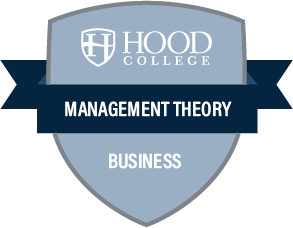Badge Overview
 Management Theory
Management Theory
Published Public {} Badge Class Data
Management Theory

Issued by Hood College
Badge Description
Offered through The George B. Delaplaine Jr. School of Business at Hood College, the Management Theory badge is designed to impart knowledge about various management theories and to develop a range of skills that are crucial for effective management in today's business environment. This badge focuses on the development/enhancement of the following key skills:
1. Critical Thinking: Analyzing and evaluating management theories.
2. Problem-solving: Applying theories to solve complex business challenges.
3. Decision-making: Using frameworks to make informed decisions.
4. Leadership: Understanding and applying leadership styles.
5. Communication: Presenting ideas effectively.
6. Ethical Awareness: Making ethical decisions in management roles.
7. Adaptability: Flexibly applying theories to changing business environments.
8. Global Perspective: Understanding global business practices and cultural differences.
9. Diversity and Inclusion: Appreciating and leveraging diverse perspectives in decision-making and team dynamics.
Critical Thinking
Problem Solving
Decision Making
Communication
Ethical Awareness
Adaptabilitiiy
Global Perspective
leadership
Badge Criteria
This FOUNDATIONAL level badge is equivalent to a 3-credit, master's-level course. A final grade of B or better is required to earn this badge.
Aligned Outcomes
-
Internal
Core Competencies
https://www.hood.edu/offices-services/institutional-assessment/institutional-learning-outcomesGSO_DivDiversity
The badge earner will recognize and engage diverse ideas, perspectives and/or traditions that inform their discipline, profession and graduate experience.
-
Internal
Core Competencies
https://www.hood.edu/offices-services/institutional-assessment/institutional-learning-outcomesGSO_CriReasCritical Reasoning
The badge earner will approach content and tasks with a critical awareness, framed by knowledge and skills appropriate to their discipline.
